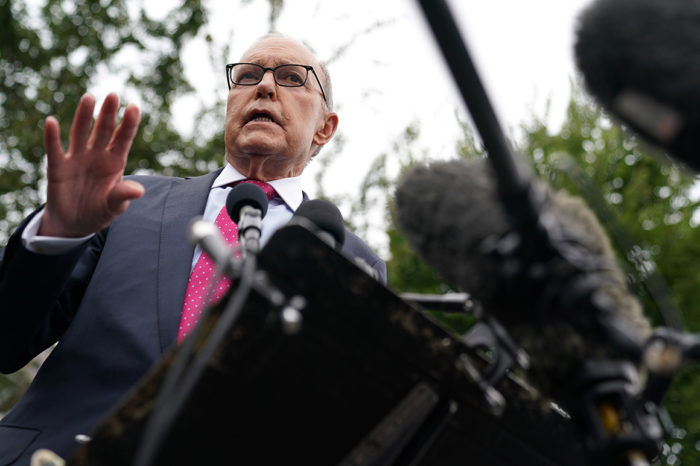
China made a peace proposal in a phone call this week with top U.S. trade officials with an offer to buy a modest amount of U.S. agricultural goods, according to two people briefed on the call.
That offer, however, could be contingent on the United States easing up export restrictions on Chinese tech giant Huawei and delaying an Oct. 1 tariff escalation on roughly $250 billion in goods, the people said.
Story Continued Below
Depending on how negotiations proceed, President Donald Trump is also considering delaying another round of tariffs that will be imposed on Dec. 15 on almost all remaining imports from China, including laptops, smartphones and other consumer goods, the people said.
Political donors and executives from major companies like Wal-Mart made a push two weeks ago hoping to persuade Trump to back off the December round of tariffs, which would severely hurt consumers, one of the people said.
White House economic adviser Larry Kudlow indicated Friday the trade talks are “going to heat up” when Chinese officials come to Washington in the coming weeks. In announcing the meeting, the two governments also said they are hoping for “meaningful progress.”
Deputy-level officials from the U.S. and China are expected to hold discussions in mid-September to prepare for a meeting of top officials in early October.
“I don’t want to predict anything. I’m just saying it is a good thing that they’re coming here, and tempers are calmer now,” Kudlow said on CNBC on Friday. “We’re engaged in very important discussions across the board, whether it’s agriculture or IP or tech transfer or cloud or cyber-hacking or trade barriers.”
Kudlow said the call on Wednesday involving Chinese Vice Premier Liu He, U.S. Trade Representative Robert Lighthizer and Treasury Secretary Steven Mnuchin “went very well.”
The U.S. Trade Representative’s office didn’t reply to a request for comment.
Talks with China collapsed in early May after Beijing backtracked on commitments it made in a 150-page draft agreement to enshrine certain obligations in its domestic law. The U.S. wants China to address policies that it says force American companies to hand over valuable technology or intellectual property to do business in the country.
“We would love to go back to where we were in May — where we were getting kind of close to an agreement, maybe 90 percent of the way. But I don’t want to predict,” Kudlow said.
Trump has also demanded that China significantly increase purchases of U.S. farm commodities like soybeans and corn. China is one of the biggest markets for U.S. agriculture exports, and farmers have been hit hard by China’s retaliation to U.S. tariffs.
But Beijing has informally tied any agricultural purchases to the U.S. treatment of Huawei. The telecommunications company was blacklisted by the Trump administration in May, effectively cutting it off from U.S. semiconductor suppliers.
The Commerce Department has reviewed dozens of applications from U.S. chipmakers requesting a waiver to ship to Huawei, but none of those have yet been approved.
The two sides are still far from a larger deal. So far, Beijing has been unwilling to make any major concessions to address issues that the U.S. says result in widespread theft of American technology.
Still, a partial deal could calm financial markets that have been whipsawed by almost every development in the nearly 2-year-old trade fight.
The U.S. Chamber of Commerce released an analysis on Friday that showed 43 percent of executives at Fortune 500 companies have raised or addressed concerns over the duties. The report comes amid growing signs that the escalating tariffs are slowing U.S. economic growth and may even be directing the country toward a recession.
“At this moment of uncertainty, it is critical that our leaders take decisive steps to bolster the economy and avoid actions that could turn talk of recession into reality,” Chamber CEO Tom Donohue wrote in a recent op-ed. “For the Trump administration’s part, the escalation of trade tensions with China must come to an end.”
Missing out on the latest scoops? Sign up for POLITICO Playbook and get the latest news, every morning — in your inbox.
